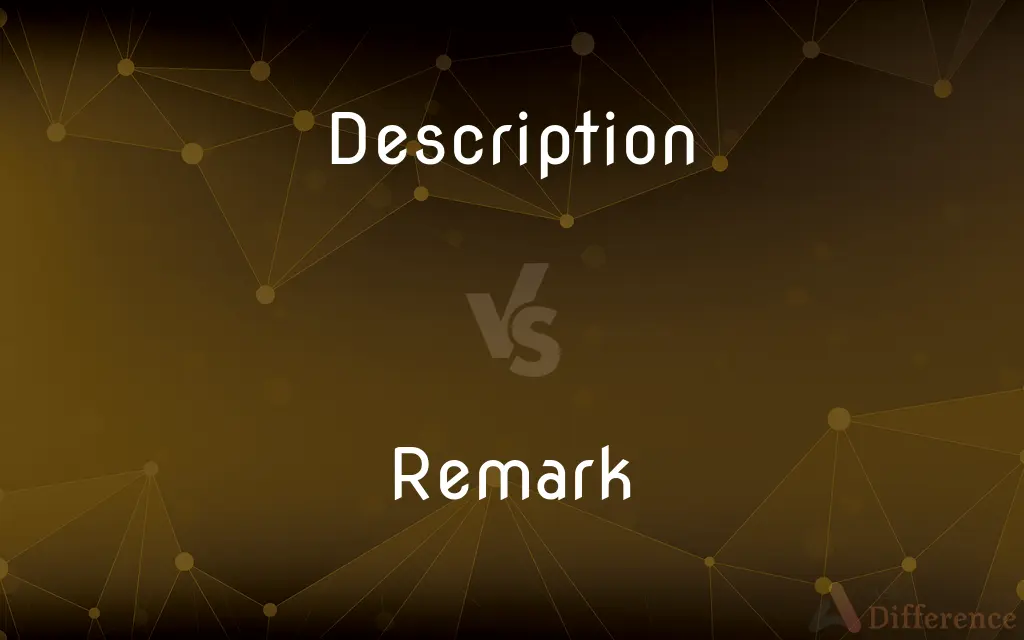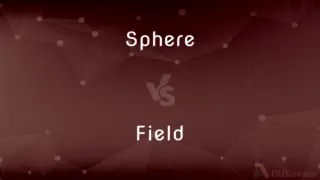Description vs. Remark — What's the Difference?
By Tayyaba Rehman & Fiza Rafique — Updated on March 29, 2024
Description provides detailed information or characteristics about a subject, while a remark is a brief comment or observation, often expressing an opinion or reaction.

Difference Between Description and Remark
Table of Contents
ADVERTISEMENT
Key Differences
A description is an account that gives a detailed or vivid portrayal of a person, object, or event. It aims to provide the reader with a comprehensive understanding of the subject by highlighting its features, attributes, or qualities. In contrast, a remark is generally a short statement or comment made about something, usually reflecting the speaker's or writer's thoughts, observations, or reactions.
Descriptions are often used to convey a deeper sense of understanding or to immerse the reader in the context being discussed. They can be factual, as in a product description, or imaginative, as in a narrative. Remarks, on the other hand, are usually concise and can be spontaneous, reflecting immediate thoughts or reactions without the need for in-depth analysis or detail.
While descriptions aim to paint a picture or provide clarity on a subject, making it understandable or relatable to the audience, remarks serve as interjections or annotations that may add personal insight, highlight a specific point, or offer an evaluative comment. Remarks might be standalone observations or can be incorporated into a conversation or text to punctuate or complement the discussion.
In writing or speech, descriptions and remarks play different roles; descriptions are key in setting scenes, explaining concepts, or detailing characteristics, whereas remarks are used to express viewpoints, inject personality, or contribute to dialogue. The choice between using a description or a remark depends on the author's or speaker's intentions—whether to elucidate or to opine.
Despite their differences, both descriptions and remarks are essential components of effective communication. A well-crafted description can enhance understanding and engagement, while a pertinent remark can provoke thought, elicit a response, or add depth to a conversation. Each, in its own way, enriches the tapestry of language by offering different methods to convey meaning, share information, and express attitudes or emotions.
ADVERTISEMENT
Comparison Chart
Purpose
To provide detailed information or portrayal
To express a brief comment or observation
Content
Detailed characteristics, features, or qualities
Brief comments, opinions, or reactions
Usage
Immersive or explanatory contexts
Conversational or annotative contexts
Detail Level
High, aiming for clarity or vivid imagery
Low, often spontaneous or succinct
Function
To inform, explain, or describe in detail
To express thoughts, observations, or reactions
Compare with Definitions
Description
A detailed portrayal or explanation.
The description of the sunset painted a vivid picture in the reader's mind.
Remark
A brief comment or observation.
Her remark on the presentation was insightful yet concise.
Description
To provide comprehensive information.
The product description listed all the specifications and benefits.
Remark
Can provoke thought or elicit a response.
The politician’s remark sparked a heated debate among the audience.
Description
Essential in storytelling and informative content.
The novel’s description of the protagonist was exceptionally detailed.
Remark
Often spontaneous or succinct.
The comedian's remark had the audience bursting into laughter.
Description
Helps the audience visualize or understand a subject.
The description made the complex concept easy to grasp.
Remark
Common in dialogue and feedback.
The teacher's remark on the essay provided constructive criticism.
Description
Involves use of adjectives and imagery.
His description of the city was filled with colorful adjectives.
Remark
To express an opinion or reaction.
His remark on the artwork revealed his deep appreciation for art.
Description
Description is the pattern of narrative development that aims to make vivid a place, object, character, or group. Description is one of four rhetorical modes (also known as modes of discourse), along with exposition, argumentation, and narration.
Remark
To express briefly or casually as a comment
She remarked that he danced very well.
Description
A spoken or written account of a person, object, or event
People who had seen him were able to give a description
Remark
To take notice of something; observe
"She climbed the stone steps quickly, remarking the queer look of her blue silk skirt and blue shoes upon the stone" (Virginia Woolf).
Description
A type or class of people or things
It is laughably easy to buy drugs of all descriptions
Remark
An act of pointing out or noticing; notice or observation.
Description
The act, process, or technique of describing.
Remark
An expression, in speech or writing, of something remarked or noticed; a mention of something
Make a remark
Pass a remark
A biting remark
A funny remark
A spoken remark
Description
A statement or an account describing something
Published a description of the journey.
Gave a vivid description of the game.
Remark
A casual observation, comment, or statement
Description
A pictorial representation
Monet's ethereal descriptions of haystacks and water lilies.
Remark
(engraving) remarque
Description
A kind or sort
Cars of every size and description.
Remark
Alternative spelling of re-mark
Description
A sketch or account of anything in words; a portraiture or representation in language; an enumeration of the essential qualities of a thing or species.
Give a verbal description of the events
A realistic description
Remark
(transitive) To pay heed to; notice; to take notice of, to perceive.
Description
The act of describing; a delineation by marks or signs.
Remark
To pass comment on (something); to indicate, point out.
Description
A set of characteristics by which someone or something can be recognized.
The zoo had no lions, tigers, or cats of any description.
Remark
To mark (someone or something) out; to distinguish, to make notable.
Description
(taxonomy) A scientific documentation of a taxon for the purpose of introducing it to science.
The type description of the fungus was written by a botanist.
Remark
To express in words or writing; to state, as an observation.
He remarked that it was getting late.
Description
(linguistics) The act or practice of recording and describing actual language usage in a given speech community, as opposed to prescription, i.e. laying down norms of language usage.
Remark
(intransitive) To make a remark or remarks on, to comment on (something).
Description
(linguistics) A descriptive linguistic survey.
Remark
Alternative spelling of re-mark
Description
The act of describing; a delineation by marks or signs.
Remark
To mark in a notable manner; to distinquish clearly; to make noticeable or conspicuous; to piont out.
Thou art a man remarked to taste a mischief.
His manacles remark him; there he sits.
Description
A sketch or account of anything in words; a portraiture or representation in language; an enumeration of the essential qualities of a thing or species.
Milton has descriptions of morning.
Remark
To take notice of, or to observe, mentally; as, to remark the manner of a speaker.
Description
A class to which a certain representation is applicable; kind; sort.
A difference . . . between them and another description of public creditors.
The plates were all of the meanest description.
Remark
To express in words or writing, as observed or noticed; to state; to say; - often with a substantive clause; as, he remarked that it was time to go.
Description
A statement that represents something in words
Remark
To make a remark or remarks; to comment.
Description
The act of describing something
Remark
Act of remarking or attentively noticing; notice or observation.
The cause, though worth the search, may yet eludeConjecture and remark, however shrewd.
Description
Sort or variety;
Every description of book was there
Remark
The expression, in speech or writing, of something remarked or noticed; the mention of that which is worthy of attention or notice; hence, also, a casual observation, comment, or statement; as, a pertinent remark.
Remark
A statement that expresses a personal opinion or belief;
From time to time she contributed a personal comment on his account
Remark
Explicit notice;
It passed without remark
Remark
Make mention of;
She observed that his presentation took up too much time
They noted that it was a fine day to go sailing
Remark
Make or write a comment on;
He commented the paper of his colleague
Common Curiosities
What is a remark?
A remark is a brief comment or observation, often expressing a person's opinion, reaction, or thought on a particular subject.
Can a remark be a description?
While a remark can contain descriptive elements, it is typically shorter and less detailed than a full description, focusing more on expressing an opinion or observation.
How do descriptions differ from remarks?
Descriptions provide detailed information and aim to portray or explain, while remarks are brief, often spontaneous comments reflecting personal thoughts or observations.
How are descriptions used in literature?
In literature, descriptions are used to set scenes, develop characters, and create immersive experiences for the reader.
What is an example of a remark adding value to a discussion?
A remark can add value to a discussion by introducing a new perspective, highlighting an overlooked detail, or summarizing a complex idea succinctly.
Why are descriptions important?
Descriptions are important because they help to convey a clear and vivid picture of a subject, making it understandable or relatable to the audience.
What is a description?
A description is a detailed account that portrays a person, object, or event, focusing on characteristics, features, or qualities to provide a comprehensive understanding.
Is one more formal than the other?
Descriptions tend to be more formal and structured, especially in written content, whereas remarks can be both formal and informal, depending on the context.
What role do remarks play in communication?
Remarks play a crucial role in adding personality, insights, or evaluative comments to a conversation, often provoking thought or eliciting responses.
Are descriptions only visual?
No, descriptions can also convey sounds, smells, tastes, and textures, enhancing the sensory experience of the audience.
Share Your Discovery

Previous Comparison
Shiver vs. Thrill
Next Comparison
Sphere vs. FieldAuthor Spotlight
Written by
Tayyaba RehmanTayyaba Rehman is a distinguished writer, currently serving as a primary contributor to askdifference.com. As a researcher in semantics and etymology, Tayyaba's passion for the complexity of languages and their distinctions has found a perfect home on the platform. Tayyaba delves into the intricacies of language, distinguishing between commonly confused words and phrases, thereby providing clarity for readers worldwide.
Co-written by
Fiza RafiqueFiza Rafique is a skilled content writer at AskDifference.com, where she meticulously refines and enhances written pieces. Drawing from her vast editorial expertise, Fiza ensures clarity, accuracy, and precision in every article. Passionate about language, she continually seeks to elevate the quality of content for readers worldwide.











































